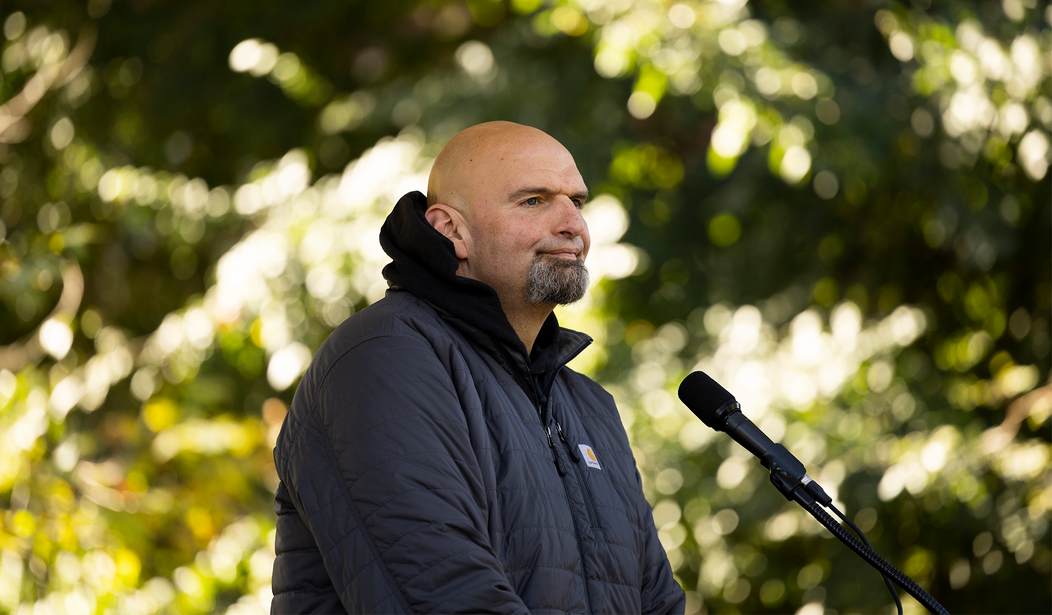The most salient issue regarding John Fetterman isn’t his record as mayor of Braddock but his health. The Pennsylvania Democratic lieutenant governor, who is also running for U.S. Senate, had a disastrous debate performance against his Republican opponent, Dr. Mehmet Oz. Fetterman suffered a severe stroke this spring, and very quickly, everyone picked up that his mental facilities were impaired when he re-emerged on the campaign trail. Fetterman refuses to release his health records, instead leaning on a doctor’s note attesting to his healthy constitution. The doctor who penned the letter is a donor to his campaign. The former Braddock mayor’s debate performance only raised more eyebrows about whether this man could serve on the Hill.
Yet, his mayoral record is also coming under scrutiny. He’s touted his mayoralty of Braddock as one of a renaissance, bringing back a dying town from the brink and serving as an earpiece to the working-class residents who dot the area. Fetterman was painted as a different Democrat, devoid of the coastal and urban-based elitism that often marks candidates of the Democratic Party. He doesn’t wear suits—he dons hoodies. He got me at one point, but in the end, this man is just a cheaper version of Bernie Sanders.
Our own Mia Cathell ventured into Braddock last week, speaking to town residents who paint a different picture of the Fetterman revival. To start, some Braddock folks are wondering where the jobs are. Cathell noted that a lot of the revitalization projects Fetterman pushed were not in keeping with the community. There might be a bougie waterfront, but where’s the grocery store:
When I questioned how often Fetterman visits Braddock's businesses or the projects he worked on, Jones said, "Not very often. I see him at the Waterfront more than I'd see him in Braddock." For those not native to Greater Pittsburgh, the up-scale Waterfront in nearby Homestead is an open-air shopping mall where you can sip on a pumpkin spice latte at Starbucks, peruse books at Barnes & Noble, watch a flick at the AMC theatre, or go Skee-Balling at Dave & Buster's.
"Technically, he is a Braddock resident but we don't see him at community events," Jones said. "A lot of people know nothing about him. And the cool thing about Braddock is like everyone knows everybody that knows somebody..."
You won't find Fetterman featured on community artwork that showcases prominent figures in Braddock either. While we were walking past the art display, a newcomer to Braddock stopped Jones, asking: "What's up with the town?
"I've been here two years. I'm on my way out," the Braddock transplant said. "You and everybody else," Jones answered. "You ain't got no grocery store down here...Ain't no bank," the resident replied. Farther down the road, the glass doors of the permanently shuttered First National Bank, near the fenced-off "#BraddockBeautiful" graffiti, remains shattered.
Recommended
Granted, she noted that he’s not entirely a boogeyman, with some saying that he did shine a spotlight on the town’s plight, while others feel he used it to further his political ambitions, doing just enough to show the press progress and then leaving everyone else in the dust.
The Washington Post now finds out that Mr. Fetterman would bypass the city council, using his nonprofit funded by his wealthy family--Braddock Redux--to finance projects when the local government became obstinate. So, was Fetterman the mayor or king? He seemed to assume a commander-in-chief role when he chased down an unarmed black man with a shotgun, claiming he was doing so in a law enforcement capacity, again highlighting Mr. Fetterman’s penchant to do things outside his purview serving as mayor:
Fetterman largely quit going to council meetings altogether. He began effectively using his nonprofit, Braddock Redux — bankrolled in part by his family — as his own shadow government to try to implement his vision of a revitalized Rust Belt community of artists and other urban homesteaders. Over Fetterman’s 13-year tenure as mayor, the private group helped launch a “Free Store” that gives away donated goods, affordable housing for artists and a youth-oriented community center. Many residents of the majority Black town of 1,700 embraced Fetterman; he was reelected three times. And his nonprofit work helped foster the folk-hero narrative that later propelled him to lieutenant governor and now, Democratic nominee for U.S. Senate.
But some in Braddock viewed the White mayor working through a nonprofit with an all-White board as circumventing public debate and input from the town’s democratically elected representatives. Instead of trying to reform what he saw as a broken government, Fetterman worked around it.
[…]
Some longtime residents also question his efforts to impose what they saw as a hipster sensibility by luring trendy businesses, including an upscale restaurant and a brewery, while also trying to shut down a longtime nightclub.
“People of color don’t drink IPA,” said longtime Braddock resident Mary Carey, 53, referring to the brewery’s flagship ale. Many Black residents saw the nightclub as a neighborhood hangout, Carey said, while the restaurant closed after a few years. “You still have to have places where people can go who live in the neighborhood.”
This account of the unusual private charity at the center of Fetterman’s record as mayor is based on a Washington Post examination of tax returns and other records and interviews with more than a dozen residents and current and former city officials.
The nonprofit offers a window into his mixed legacy in Braddock, one of the poorest communities in the state, where some of his signature projects are struggling to sustain funding.
His role as president of a nonprofit enabled him to exercise power and spend money in a way he could not as the mayor of a tiny, financially strapped borough whose only official duties were to oversee police and cast tiebreaking council votes. To supporters, that’s exactly the kind of outsider mentality that Washington lacks.
[…]
Braddock Redux drew in more funding and tackled more ambitious projects, some in town chafed at the hard-charging mayor who built a national profile highlighting the town’s despair.
“He needs to tone down his rhetoric about the community and the bad shape the community is in and the devastation of the housing,” Brown, the former council president, told The Pittsburgh Post-Gazette in 2009. “If he feels that the community is bankrupt, then he needs to go somewhere where he’d like it.”
A review of 14 years of the nonprofit’s tax filings shows that revenue increased during the years that Levi Strauss & Co contributed, but other sources of money are difficult to verify because the IRS does not require tax-exempt organizations to publicly disclose donors.
It’s unclear how much money Fetterman’s parents invested in the nonprofit over the last two decades. Fetterman has said he used family money when Braddock Redux bought the church that was later converted into the community center. Tax filings say the nonprofit received a loan from a “related party” in 2003 that was paid off in 2015.
Tax records also show Braddock Redux received about $245,000 between 2007 and 2013 from “disqualified persons,” a classification that includes relatives of board members, but Fetterman’s campaign said it could not confirm all of that money came from his family. Fetterman’s father also donated about $18,000 in insurance coverage from his firm between 2011 and 2017, tax filings show.
The myth of John Fetterman is unraveling, though again, the health of the former Braddock mayor is the most pressing issue here. Only after this election will we learn more about Fetterman’s activities as mayor, along with full disclosure of his health records. He’s starting to look like a typical politician—gee, what a shock.
Lol John Fetterman just defended putting gun to black jogger by labeling himself the “chief law enforcement officer” of Braddock. Is that really a mayoral role? Commander in chief of the Braddock police force?
— Brent Scher (@BrentScher) October 26, 2022

























Join the conversation as a VIP Member